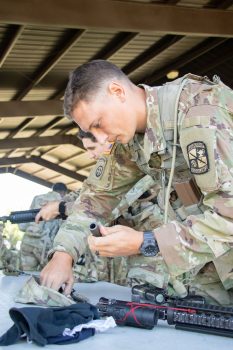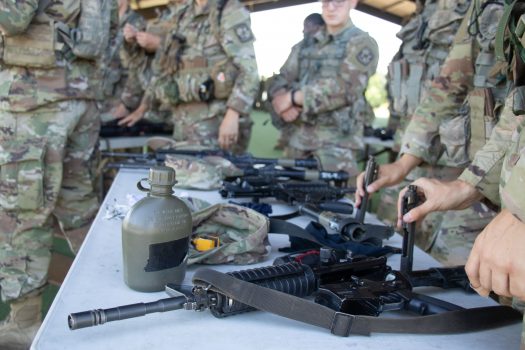By: Anna Pray
4th Regiment Cadets were taught how to disassemble and reassemble their weapons by Cadre on June 17, 2021 during their Preliminary Marksmanship Instruction at Cadet Summer Training Advanced Camp in Fort Knox, Ky.
Some Cadets, whether they had previous experience with weapons or no experience at all, enjoyed the lesson on how to take apart, clean, and put back together their weapon.
“Learning the insides of it, how it functions, and why it functions that way is pretty cool,” said Cadet Cimiya Duffin, from Morgan State University in Maryland.
“It’s almost like Lego pieces,” said Cadet Tyler Rowe, from Texas Christian University. “Everything comes apart and has to get put back together in the right place. When you get it right the first time, it feels good.

Even before the lesson, Rowe said he felt comfortable with his weapon.
“I’ve had some experience in the past with it, but this was such a great refresher for me,” said Rowe. “But it was also cool to see everyone who hasn’t had that experience really learn how to do it and master it today.”
According to Cadet Ethan Seitz, from University of Tennessee at Chattanooga, they learned the importance of keeping their weapons clean and maintained.
“Once we get a weapon, the first thing we are doing is cleaning it out,” said Seitz. “Like getting to the internals, cleaning those and making sure it’ll work okay. When it’s time to go qualify down at the range, all of those inner workings need to be working fine in order to cycle the next round. If it doesn’t cycle, you only have so many seconds with that target up before it goes back down.”
During their lesson, Cadets were also taught how to transition into and out of shooting positions and weapons safety protocols such as treating a weapon like it is always loaded. In order to gain confidence, Cadets were shown how to hold their weapon, how to zero it and how to change their sights on their scopes so that it hits the target.
In reference to cleaning their rifles, Rowe and Seitz agreed that the process took awhile for it to be done well and that it could affect shooting if it is not done correctly.
“Taking care of equipment is a big thing, especially in this type of environment,” said Seitz. “We are always outside everyday with dust, dirt, debris.”
“This [rifle] is what we rely on for our lives and winning on the battlefield,” said Rowe. “If you understand how it works, you also will know how to fix it when you have problems.”





